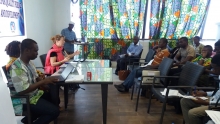Liberia: Trade unions and CSOs moving forward together

The first workshop was held on labour legislation. Since the Liberian government still has not reinstated various dismissed trade union leaders, and is refusing to recognise workers’ organisations in the public sector (even though the right to association is secured in the Liberian constitution), the unions and CSOs united in the consortium wanted to extend their legal knowledge and elaborate a broad campaign on the matter.
As the public service unions had expected, there is nothing in the Liberian legislation that forbids workers to organise and form trade unions in the public sector. This right is not only clearly stated in the constitution, Liberia has also signed the two related ILO conventions 87 and 98 that secure the right to organise and trade union rights.
And although the specific functioning rules for civil servants, elaborated in the Civil Service Standing Order, do not specifically mention the right to organise and form a trade union, the Code of Conduct for all public officials and employees of the government of the Republic of Liberia obliges the government of Liberia "to accord an employee of the government of Liberia the right to join a trade union of his or her choice for the promotion and protection of his or her economic and social interests in accordance with law."
It is therefore clearly a political choice of the Liberian government to refuse certification of trade unions in the public service, in order to avoid any instauration of social dialogue. During the final planning discussion of the workshop, participating trade unions decided to elaborate a pledge for Trade Union Rights in the public sector which will be a campaigning platform for engaging with politicians during the period towards the upcoming elections.
Barely two weeks later, another important workshop took place in Monrovia, this time in collaboration with Oxfam and Action Aid, on the topic of Tax Justice, an overarching problem that touches multiple campaigns and challenges in the country. As primary education has been privatised in Liberia, PSI already organised two workshops on Public Private Partnerships last year.
As the Liberian government rejects any action objecting to their moves with the argument “There Is No Alternative”, the trade unions and civil society organisations were keen to gain more insight into possible mechanisms for financing of public services. Daniel Oberko, PSI’s Tax Justice Organiser for the region, kicked off the day by introducing the mechanisms used by companies to avoid paying taxes and the practice of countries like Liberia to profile themselves as tax havens, thus assisting and enabling companies in their tax avoidance.
During the presentations by the various panels, it became clear that Liberia’s tax system has some structural problems, granting tax reductions or clearance to foreign companies but weighing heavily on its own citizens, causing difficulties for young local enterprises to survive and the state budget to miss out on substantial and much-needed funds to organise public services for Liberian citizens. All organisations present decided it would be crucial to stay united on this matter and to elaborate common actions for change.
These are exciting times in Liberia, with the upcoming elections making politicians a bit easier to approach and open for discussion, and a growing consortium of motivated trade unions and civil society organisations motivated to act for change.
by Wendy Verheyden, PSI Regional Ebola Coordinator

